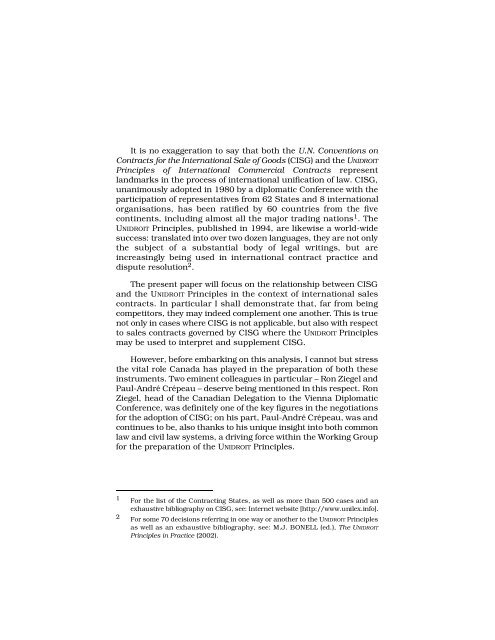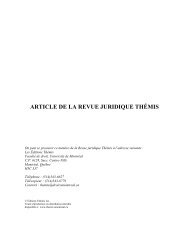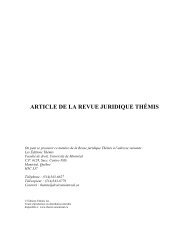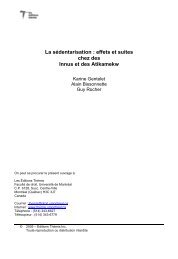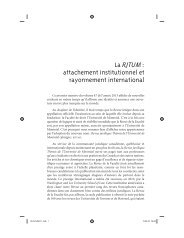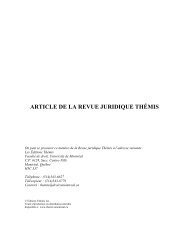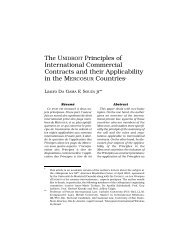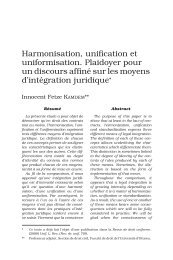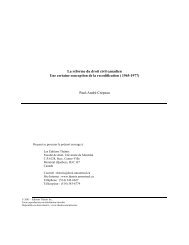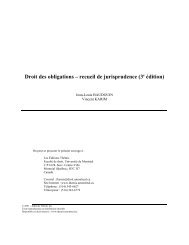The UNIDROIT Principles of International Commercial Contracts and ...
The UNIDROIT Principles of International Commercial Contracts and ...
The UNIDROIT Principles of International Commercial Contracts and ...
Create successful ePaper yourself
Turn your PDF publications into a flip-book with our unique Google optimized e-Paper software.
It is no exaggeration to say that both the U.N. Conventions on<br />
<strong>Contracts</strong> for the <strong>International</strong> Sale <strong>of</strong> Goods (CISG) <strong>and</strong> the <strong>UNIDROIT</strong><br />
<strong>Principles</strong> <strong>of</strong> <strong>International</strong> <strong>Commercial</strong> <strong>Contracts</strong> re p re s e n t<br />
l<strong>and</strong>marks in the process <strong>of</strong> international unification <strong>of</strong> law. CISG,<br />
unanimously adopted in 1980 by a diplomatic Conference with the<br />
participation <strong>of</strong> representatives from 62 States <strong>and</strong> 8 international<br />
o rganisations, has been ratified by 60 countries from the fiv e<br />
continents, including almost all the major trading nations 1 . <strong>The</strong><br />
UN I D R O I T <strong>Principles</strong>, published in 1994, are likewise a world-wide<br />
success: translated into over two dozen languages, they are not only<br />
the subject <strong>of</strong> a substantial body <strong>of</strong> legal writings, but are<br />
i n c reasingly being used in international contract practice <strong>and</strong><br />
dispute resolution 2 .<br />
<strong>The</strong> present paper will focus on the relationship between CISG<br />
<strong>and</strong> the UN I D R O I T <strong>Principles</strong> in the context <strong>of</strong> international sales<br />
contracts. In particular I shall demonstrate that, far from being<br />
competitors, they may indeed complement one another. This is true<br />
not only in cases where CISG is not applicable, but also with re s p e c t<br />
to sales contracts governed by CISG where the <strong>UNIDROIT</strong> <strong>Principles</strong><br />
may be used to interpret <strong>and</strong> supplement CISG.<br />
However, before embarking on this analysis, I cannot but stress<br />
the vital role Canada has played in the preparation <strong>of</strong> both these<br />
instruments. Two eminent colleagues in particular – Ron Ziegel <strong>and</strong><br />
Paul-André Crépeau – deserve being mentioned in this respect. Ron<br />
Ziegel, head <strong>of</strong> the Canadian Delegation to the Vienna Diplomatic<br />
Conference, was definitely one <strong>of</strong> the key figures in the negotiations<br />
for the adoption <strong>of</strong> CISG; on his part, Paul-André Crépeau, was <strong>and</strong><br />
continues to be, also thanks to his unique insight into both common<br />
law <strong>and</strong> civil law systems, a driving force within the Working Group<br />
for the preparation <strong>of</strong> the <strong>UNIDROIT</strong> <strong>Principles</strong>.<br />
1<br />
2<br />
For the list <strong>of</strong> the Contracting States, as well as more than 500 cases <strong>and</strong> an<br />
exhaustive bibliography on CISG, see: Internet website [http://www.unilex.info].<br />
For some 70 decisions referring in one way or another to the <strong>UNIDROIT</strong> <strong>Principles</strong><br />
as well as an exhaustive bibliography, see: M.J. BONELL (ed.), <strong>The</strong> UN I D R O I T<br />
<strong>Principles</strong> in Practice (2002).


